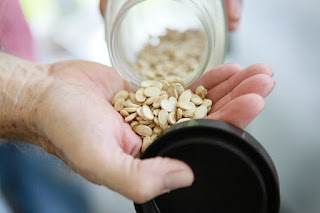
Certified Seed Production
Seed is a basic agricultural input and it is an embryo, embedded in the food storage tissue. Seeds with good germination capacity and seed vigor are considered as quality seeds. Quality seed production which follows efficient certification procedures plays a major role in the increase of food production.
High quality certified seed production requires considerable technical skill and a number of rigid requirements must be fulfilled in order to ensure a high purity and germination of seed. Seed multiplication involves two aspects, seed production, and Seed processing.
Seed production requires improved cultural practices and efficient weed, disease and pest control. Maintaining optimum irrigation, fertilizer inputs, and some other specific operations are required. Generally every state Govt. has the specific body for seed certification.
The certification process involves a thorough testing throughout the session. Certified seed production is a profitable business. Any individual can initiate this venture as small scale concentrating with one or two crops.
Market Opportunity For Certified Seed Production
The rising demand for food and rapid decline in arable land has augmented the demand for agricultural products which in turn exerted pressure on farmers to increase the productivity in various crops grown on available limited land.
In order to avail optimum utilization of the land available for cultivation, use of improved & high yielding seed is considered essential. Seed is considered to be one of the most important parts of agriculture crop production on which the use of others agri-inputs efficiency depends on.
Certified seeds are consequently seen as those products which can improve the return on investment and respond to consumer demands for economical agricultural production by increasing per unit seed production and per hectare production.
High growth potential in emerging markets and untapped regions, provide new growth opportunities for market players in certified seed production. The growth of this market is also driven by changing composition of diet and other industrial demand for the crop produce, which is leading to commercial crop area expansion.
The global market for seed was valued at $53.76 Billion in 2014 and is projected to reach $92.04 Billion by 2020, at a CAGR of 9.4% from 2015 to 2020.
Certified Seed Production Business Plan
The business has long term operational measures. You must craft a business plan according to the finance availability. For cultivation, it requires huge land. Careful field selection is mandatory for quality yield.
The land should be level, fertile and free from noxious weeds common to the crop. Contract farming is the best way to start when you don’t have enough land of your own. Contract farming is a biparty agreement which is made between the farmer and the company.
The agreement contributes directly to the management of the farm through input supply as well as technical guidance and also markets the produce. The main features of this type of contract farming are that selected crops are grown by farmers under a buyback agreement with an agency engaged in processing. Determine which seed you will be going to produce. According to the land acquired, go for arranging breeder seed. Prepare the budget with the input costs. Craft a financial planning with investment and projected ROI.
Certified seed production includes three major operations. Such as isolation, cultivation, and certification.
Isolation: Certified seed production fields are carefully isolated from other crops to prevent contamination from other varieties or crop kinds. Isolation is essential to prevent pollination from unwanted pollen in the case of cross-pollinated and often cross-pollinated species and to avoid mechanical mixture and chance of cross-pollination in self-pollinated species.
Roguing: You must inspect your crops throughout the growing season. Improved cultural practices must be followed for raising a good seed crop. Recommended dose of fertilizers and irrigation water must be applied for high yields of high-quality seed.
Plant Protection: Proper measures must be taken to protect the seed crop from disease and pests. Insect pests and diseases may cause considerable damage to the crop reducing the yield and quality of seed. Some disease may lead to rejection of the seed by the certifying agency as unfit for use as seed.
Inspection: Govt. agency will inspect your field. After passing the inspection and meeting you will receive an official crop certificate.
Harvesting: At the proper stage of maturity, you must harvest the seed crop. It should be done with considerable care in order to prevent the mechanical mixture from other crop seed or weed seeds. The threshing floor should be clean and preferably cemented to keep the contamination from inert matter to a minimum.
Testing & Grading: Certified seed requires separate storage to preserve unique genetic identities. The Govt. agency will test and verify your seeds in an accredited lab for compliance with standards for germination and physical purity. The seeds go through an intricate grading process. The final step of certified seed production is bagging with labeled by variety name with an officially certified seed tag.
















0 Comments: